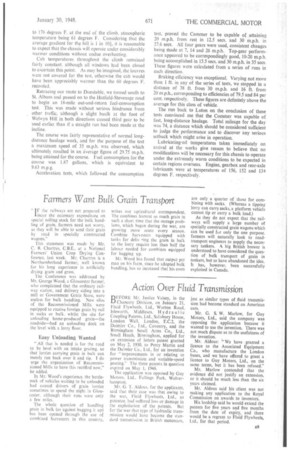Farmers Want Bulk Grain Transport
Page 47

If you've noticed an error in this article please click here to report it so we can fix it.
IF the railways arc not prepared to lincur the necessary expenditure on special rolling stock for the bulk handling of grain, farmers need not worry, as they will be able to send their grain by road in specially constructed wagons."
This statement was made by Mr. C. B. Chartres, C.B.E., at a National Farmers' Union Crop Drying Conference, last week. Mr. Chartres is a Northumberland farmer, well known for his long experience in artificially drying grain and grass.
The Conference was addressed by Mr. George Wood, a Gloucester farmer, who complained that the ordinary railway station, and delivery siding into a mill or Government Grain Store, were useless for bulk handling. New silos of the Recommissioned Mills were equipped to receive foreign grain by rail in sacks or bulk, whilst the site for unloading home-produced grain—the roadside—had an unloading dock on the level with a lorry floor.
Easy Unloading Wanted "All that is needed is for the road to be level with an intake grating, so that lorries carrying grain in bulk can merely run back over it and tip. I do urge the organization of Recommissioned Mills to have this rectified now," he added.
In Mr. Wood's experience, the bottleneck of vehicles waiting to be unloaded had caused drivers of grain lorries sometimes to spend the night in Gloucester, although iheir runs were only a few miles.
The whole question of handling grain in bulk (as against bagging it up) has been opened through the use of combined harvesters in this country,
writes our agricultural correspondent. The combines harvest so much grain in such a short time that the storage problems, which began during the war, are growing more acute every season. Combine harvesters equipped with tanks for deliv ring the grain in bulk to the lorry require less than half the labour needed for combines equipped for bagging up.
Mr. Wood has found that output per man on his farm, since he adopted bulk handling, has so increased that his costs
are only a quarter of those for combining with sacks. (Whereas a tipping lorry can carry sacks, a platform vehicle cannot tip or carry a bulk load.) As they do not expect that the railways will supply a large number of specially constructed grain wagons which can be used fur only the one purpose, farmers will naturally look to roadtransport engineers to supply the necessary tankers. A big British brewer is understood to have considered the question of bulk transport of grain in tankers, but to have abandoned the idea. It has, however, been successfully exploited in Canada.
























































































